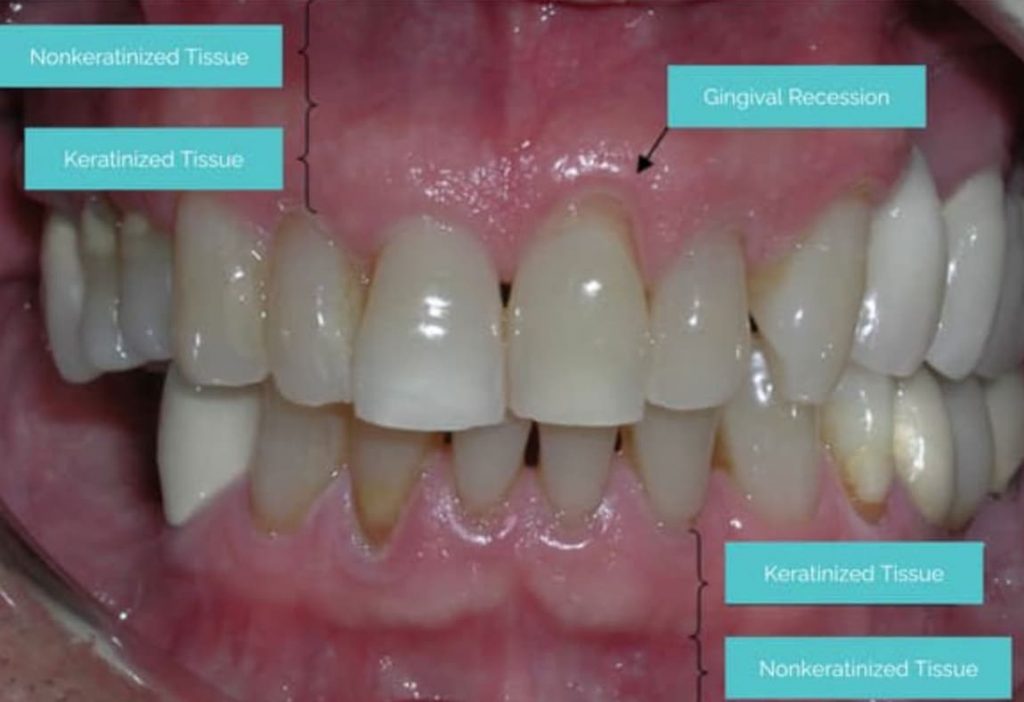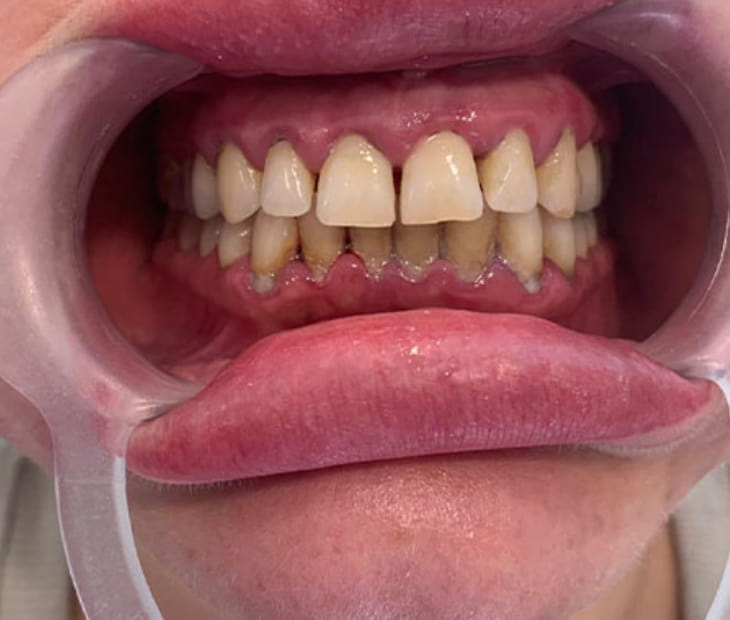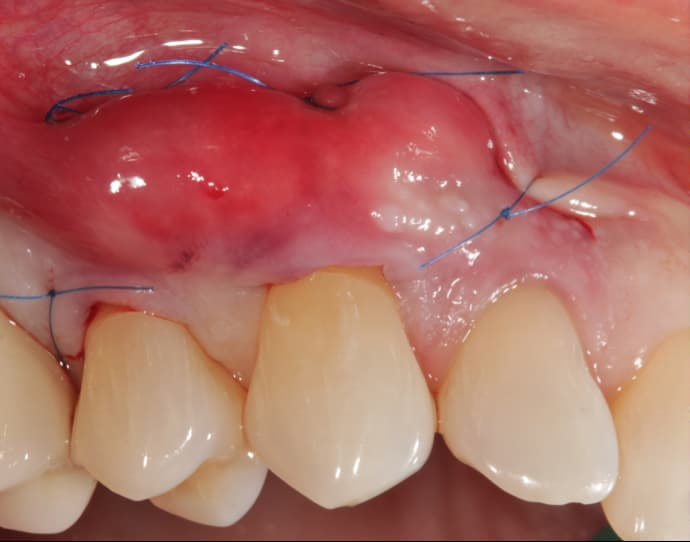Gum recession is something that many people experience. It is, as the name suggests, a situation in which the gum tissue surrounding the teeth starts to move away. As a result, more of the tooth’s surface is exposed.
Even though it’s a common problem, it shouldn’t be taken lightly since it can lead to gum disease, tooth loss and even jawbone deterioration. Unfortunately, many people inadvertently cause gum recession due to how they brush or poor oral hygiene.
In this guide, you’ll learn more about gum recession, its symptoms, causes and severity. It may help you get treatment in time.
What Is Gum Recession?
Gum recession, also known as gingival recession, refers to the pulling back of pink tissue surrounding the teeth. It results in an abnormal overexposure of the teeth.
And depending on the severity of the problem, even the roots of teeth might be exposed. Or if you have a dental implants Turkey, gum recession can expose its platform as well.
Keep in mind that gums or gingiva not only hold the teeth in place but also protect them from disease. Moreover, they also cover the underlying jawbone to keep it intact. So, receding gums can cause a lot of problems for you.

For instance, gum recession can cause plaque build-up (although it can also happen the other way around). It can make your teeth more prone to cavities and cause damage to your underlying bone and the soft tissues.
In general, it’s common for people to have a gingival recession. According to a study published in the International Dental Journal, the prevalence rate of this problem is anywhere between 40% and 100%. Also, you can have gum recession in front teeth and/or bottom teeth gum recession. It can even affect the spaces between teeth.
However, some teeth are more affected by this problem than others. Research published in the Journal of Indian Society of Periodontology found that this problem was most commonly seen in the incisors of the lower jaw (43%).
This was followed by the molars in the upper jaw (13.2%) and premolars in the lower jaw (12.2%).

What Causes Receding Gums?
There are many causes of gum recession. According to the study mentioned right above, the most common gum recession causes are dental plaque accumulation and poor brushing technique. Let’s take a closer look at these and the other factors of gum recession.
Brushing Or Flossing Teeth Too Hard
Brushing your teeth is not the same as scrubbing dirt or stains out of upholstery. Aggressive brushing can not only damage the enamel of your teeth but also cause gum recession.
Keep in mind that every time you do this, you’re wounding your gum tissue. And since, normally, you’re supposed to brush your teeth everyday, it can eventually make your gums recede. The same can happen if you over floss or do it too hard.
One study published in the Dental Research Journal found that horizontal brushing technique, using a type medium toothbrush and only brushing once a day were factors that were more associated with gum recession.
Gum Disease
One of the common gum recession causes is gum disease. It can happen due to poor oral hygiene, where there’s a build-up of plaque around the teeth.

With pockets surrounding the teeth, there’s going to be more bacteria stored there. It will damage your teeth, jawbone and make your gums recede too.
Hormonal Changes
Hormonal changes experienced by women can also make them more prone to gum recession. According to a review published in Women Health, both oestrogen and progesterone increase the likelihood of gum inflammation.
Progesterone affects the production of collagen in the gums. Both of these hormones also cause “folate deficiency,” affecting gum heath and negatively affecting the immune system. Gingivitis is common during pregnancy, and that can cause gum recession.
Genetics & Age
It’s even possible for your genetics to end up causing gum recession, even when you’re doing it all right.
Similarly, the natural process of ageing can cause your gums to recede. Although it could just be the cumulative effect of a process that started early on in your life, so you need to be careful from the start.
Trauma
An injury to the gum tissue can also cause it to recede. This injury can be more direct, like from a sharp object. Even gum piercings can cause recession.
However, it can also be inflicted more indirectly, for instance, through teeth grinding. The intense pressure you put on the gums that way can cause them to pull back.
Misaligned Teeth
Misaligned teeth can be another cause for concern when you have gums receding. It’s because of the pressure that your gums might have to sustain because of how your teeth meet with each other.
Smoking
Smoking and using other tobacco products have also been linked to the gum recession. This can be due to the chemicals found in tobacco products.
But it can also be more indirect. That’s because smoking leads to more plaque and a higher risk of gum disease, which can, in turn, cause this problem.
Orthodontic Treatment
Those with braces often ask if their treatment can cause gum recession. While braces may not directly contribute to the problem, it might lead to gum recession through more indirect processes.
According to a study published in the European Journal of Dentistry, those with “fixed orthodontic appliances” had plaque and inflammation with gum recession.
What Are Gum Recession Symptoms?
The symptoms of gum recession may include:
- Teeth that look unusually long
- Sensitivity to hot, cold and sweet foods
- Teeth that feel mobile
- Bone loss
- Tooth root decay
Also, you might experience gum recession pain and discomfort. Although since this process can be slow, you might not realise that you have a problem until you start experiencing its various symptoms.
You must also keep in mind that these symptoms can vary if you have developed another oral health problem like gum disease. In that case, you can also experience:
- Bleeding
- Swelling
- Tenderness
- Tooth loss
The above list is, of course, not exhaustive.
What Are Receding Gums Stages?
It may be possible to divide gum recession into different stages.
Early Gum Recession
According to a study published in Dental Press Journal of Orthodontics both accumulation of dental plaque and inappropriate brushing techniques can lead to the development of early gum recession.
Also gum recession can also happen quite quickly because of other factors, such as a traumatic injury. But, of course, as mentioned above, sometimes, it can take some time for you to notice that you even have receding gums.
However, once you do start experiencing its symptoms, you may have sensitivity and may even feel a tooth indentation where the gums are receding.
Mild Gum Recession
There are different severities of gum recession depending on the exposure of the tooth’s root surface.
According to a study published in the Journal of Applied Oral Science, it’s considered present when 1mm of root surface is exposed, mild when less than 3mm of root surface is exposed and moderate when it’s 3-4 mm.
Severe Gum Recession
In contrast, the study above also noted that when more than 4mm of the root surface is exposed to the surroundings, then the gum recession is considered advanced.
This is, of course, more dangerous and is likely to cause severe symptoms, such as pain and sensitivity.
How To Treat Receding Gums?
Receding gums treatment can depend on the underlying cause of the problems and its overall severity.
For instance, if you have plaque buildup, your dentist might recommend root planing and scaling to get rid of the tartar above and below the gumline. But instead if the problem is misaligned teeth, you might get orthodontic treatment to fix your bite. It depends on the actual problem.
And as far as the exposed root surfaces are concerned, since they can cause a lot of problems, your dentist might recommend composite bonding or even veneers to cover them up.
However, if your problem is more severe, you might need gum graft surgery. In this, tissue will be removed from inside your mouth to attach to the gums. You might need a couple of weeks to start feeling normal after this.

A gum regeneration surgery might also be done, if your bone tissue along with the gum, has been severely damaged. So, the treatment for receding gums can vary depending on your condition.
The answer to “how to treat receding gums” or “how to fix gum recession” can only definitely come from your dentist. Keep in mind that you don’t always need surgery.
How To Prevent Receding Gums?
If you’re wondering how to stop gum recession or how to prevent gums recession entirely, the following might help:
- Brush twice a day with the proper technique and use a soft-bristled brush.
- Use a gentle floss and consider using one that’s waxed as it may glide more easily.
- Avoid smoking or using any tobacco products.
- Get regular dental checkups.
Can Gum Recession Be Reversed?
It is not possible to reverse the gum recession process. Once the tissue is gone, a new one won’t grow in its place to replace it. For this reason, if you are experiencing gum recession, make sure to receive treatment as soon as possible.
Conclusion
Gum recession is a common problem. However, it can have serious consequences for your oral health. It can not only affect the teeth but also the surrounding bone and tissue. Also, it can cause other problems like gum disease.
There are different reasons why this can happen – some factors you control, while there are others that can be out of your control, like your genetics or hormonal changes. In any case, it’s important to keep an eye out on your gum’s health.
And if you are experiencing any problems, make sure to get in touch with a dental professional as soon as possible for an effective treatment for gum recession. Gum recession treatment can be surgical or non-surgical.
Reviewed and approved by Dr. Izbel Aksit
FAQ
Is gum recession normal?
While gum recession can happen due to genetics or even ageing, it’s not considered normal because it can negatively affect your oral health.
How to stop receding gums?
To stop receding gums, you need to address the culprit, whether it’s your brushing technique or poor oral hygiene. You must also get treatment.
Why do gums recede?
Gums can recede due to different reasons, such as dental plaque, gum disease, improper brushing, trauma, genetics, age, hormones, smoking, poor bite and even dental treatments.
Can gum recession be cured?
There is no cure for gum recession. But it’s possible to take care of receding gums through the right treatment.
